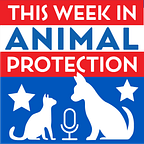
These are some of the stories making headlines in animal protection:
Subscribers can also listen to the podcast above, which includes extended commentary on many of the issues, including why studies about animal emotions and intelligence are important to giving animals more legal protection even though their findings are often obvious; as well as why backsliding in places like Rosenberg, TX, San Francisco, CA, and other communities embracing “Human Animal Support Services” harms animals, including orphaned kittens, and prevents future progress, especially of “behavior” dogs.
For years, scientists have cautioned against “anthropomorphizing” animals, saying we shouldn’t ascribe human experiences to them. Rather than answering the question, “do dogs love us?” with a resounding “yes!” they argued that we couldn’t say that dogs have emotions like love. At best, they had “emotion states” or “emotion-like states,” even when the behavior was indistinguishable from humans, except perhaps in the language ability used to express them.
They aren’t saying those things anymore.
Dogs are strikingly similar to humans in the caudate nucleus, the structure of the brain region associated with positive emotions, like love. As such, dogs experience love and attachment comparable to human children. Indeed, the capacity to “love may be natural selection’s most compelling force, driving us and our fellow animals to care beyond reason for our families, loved ones, and children.”
Dogs do love us. And in a recently published study, researchers prove we can see it in their eyes. Like people after a long absence, dogs shed tears of joy when reunited with family (and those tears are filled with oxytocin, the feel-good “love” hormone associated with bonding). They only shed those tears with their human family and not with others, even those who were familiar to them.
But in typical — though scientifically understandable — fashion, researchers concluded that “Through this process, their tears might play a role in eliciting protective behavior or nurturing behavior from their owners, resulting in the deepening of mutual relationships and further leading to interspecies bonding.”
Or, you know, they could just be happy to see us, because… love.

As more people turn to rescue and adoption and more shelters embrace progressive policies, the number of communities placing over 95% and as high as 99% of the animals is increasing.
Lake County, CO, reported a 99% placement rate for dogs and 97% for cats.
Grand County, CO, reported a 96% placement rate for dogs, 95% for cats, and 100% for other small animals.
These communities and national data prove that animals are not dying in pounds because there are too many, too few homes, or people don’t want the animals. They are dying because people in those pounds are killing them. Replace those people, implement the No Kill Equation, and we can be a No Kill nation today.
If passed, Assembly Bill 2344 in California “would bring more wildlife crossings to our highway system,” reducing the number of animals killed on our roads. “By prioritizing and investing in freeway overpasses, underpasses and other critical improvements,” the bill’s sponsor says, “we can make our roads safer for wildlife and drivers.”
Studies show that doing so will reduce roadway wildlife mortality by as much as 90%. And while some will no doubt claim that we should focus on people, not animals, such a view is hard-hearted. It is also small-minded: a study by the Nevada Dept of Transportation analyzed overpass costs vs. benefits in terms of reduced animal-vehicle collisions and found a benefit-cost ratio of 1.58, meaning for every $1 spent on building the project, the state realized $1.58 in benefits. Specifically, they found a significant reduction in “vehicle damage, and reduction or elimination of human injuries or possible fatalities,” thus making the project “worthwhile.” Even if that were not true, it would still be worthwhile for the animals. After all, it’s their world, too.
It does not look like McDonald’s will be doing a national rollout of the McPlant, a vegan burger, they were test-marketing in select cities. According to company reports, the McPlant did not sell in high enough quantities. I blame the lack of marketing, the lack of vegan cheese and mayo, and non-vegan fries. Who eats a burger without fries?
By contrast, Burger King and Taco Bell are forging ahead with vegan items. In addition to its successful Impossible Whopper and Impossible sausage breakfast sandwich, which are available nationwide, Burger King is now test-marketing an Impossible chicken sandwich in select cities. Meanwhile, Taco Bell is test marketing vegan beef for its tacos, burritos, and other items in about 50 cities nationwide. And after a successful test market, Nestle “is launching KitKat V, a plant-based version of one of the world’s most popular chocolate bars… with a rollout planned across 15 European countries including the UK.” No word yet on when it will be available in the U.S.
After a Los Angeles Times investigation revealed that dogs spent weeks and sometimes months without getting out of their kennels for walks, Los Angeles Animal Services turned to their new director of volunteer services to try and build a program to socialize animals.
The L.A. Times reports that during a meeting with other employees, the director they hired said “that he is scared of large dogs, but small ones can be managed because he can strike them.” And rather than punish him, they fired the volunteer that reported him for his comments about hitting small dogs. Doing so is illegal. Volunteers not only have a First Amendment right to speak out about conditions in a government shelter; they have a constitutionally protected right to demand that the government correct the wrongs that are identified.
Similarly, the St. Louis County, MO, Animal Shelter is illegally trying to silence critics. Like Los Angeles, the St. Louis County shelter has a long history of killing animals despite cost-effectively, readily-available lifesaving alternatives they refuse to implement. They have illegally retaliated against volunteers trying to help clean up their mess. And a “scathing audit” “found multiple breakdowns at the animal shelter,” including lying to people to kill their animals without counting them in statistics.
Now come reports that after killing a woman’s dog, their attorneys are trying to silence her in court, preventing her from going public with evidence of their deplorable misconduct. Doing so is unethical. We live in a democracy, and the killing is paid for with our tax dollars in public institutions which are supposed to reflect our values but currently hinder them. And, once again, it is also illegal.
Before its embrace of the No Kill Equation model of sheltering, Rosenberg, TX, was killing roughly 70% of the animals. Under mentorship by The No Kill Advocacy Center, Rosenberg became not only one of the safest communities in the nation for homeless animals; it was a model for the nation. In 2021, it had a placement rate of 99% for dogs, 96% for cats, and 96% for rabbits and other small animals. That effort and those results are now threatened with the departure of their director.
















